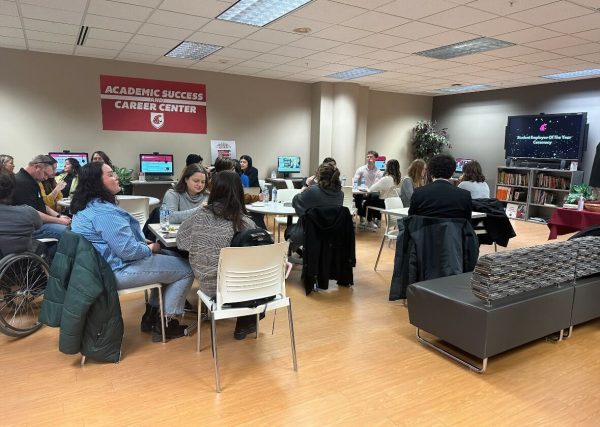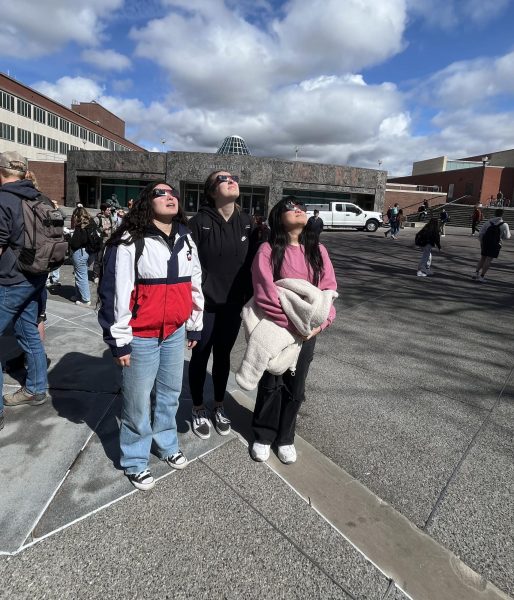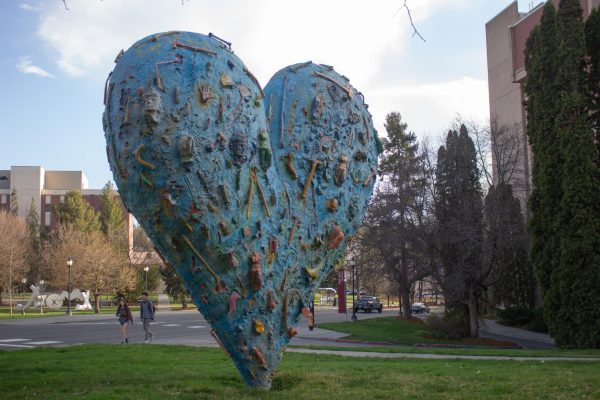Limited resources for nonprofits
Approaching winter months present new challenges for organizations on the Palouse
Executive director Stephen Bonnar discusses what services and resources Soujourners’ Alliance provides, their goals and the organization’s history on Thursay at his office in Moscow.
November 4, 2019
Community organizations and nonprofits are preparing resources, despite financial challenges, for the homeless population on the Palouse as winter approaches.
Jeff Tietjen, Community Action Center senior housing coordinator, said Whitman County provides no emergency shelters for the homeless population during the winter.
Last year, agencies in Pullman ran a warming shelter, but due to a period of transition and lack of funding, there will not be one this year, Tietjen said.
Stephen Bonnar, Sojourners’ Alliance executive director, said the hope is to have a warming center next year. A shelter requires several resources, such as staff, insurance, maintenance, safety precautions and funding.
Tietjen said unless a town has a homeless population of 50 to 60 people daily, it is not financially feasible to have an emergency shelter, which Pullman does not.
The action center can provide emergency vouchers for a one- or two-night stay in a local motel, if there is availability. They also have emergency transportation vouchers for bus tickets, Tietjen said.
During football game days or big events in Pullman, hotels usually do not have vacancies, so people needing a hotel voucher must find shelter elsewhere, he said.
Funding for vouchers comes from a community relief fund. A group of community members and organizations created the Poverty Awareness Task Force about three years ago to provide emergency transportation and shelter, he said.
People set up camp along the Palouse River by the Pullman Village Centre Cinemas and under the bike bridge by Schweitzer Engineering Laboratories, Tietjen said.
“It only takes one person sleeping out in the cold, then you have a problem,” he said.
Sojourner’s Alliance, a nonprofit in Moscow serves dozens of homeless people per year with transitional housing.
Bonnar said the Sojourners’ Alliance is the main organization on the Palouse to provide services to the homeless population.
Bonnar was homeless for three years during his youth and then became a therapist for 15 years and has been with the Sojourner’s Alliance for 13 years.
The nonprofit provides 7,000 bed nights, which is the number of nights a person sleeps in off-site housing per year. The average time a person uses housing services is about 270 days or nine months each year, Bonnar said.
There is one house for 10 men, one house for women and three houses for homeless families, he said. Currently, the men’s house is full and the women’s house has one opening.
The nonprofit rents 11 apartments for homeless individuals with disabilities. He said the average person using housing stays in an apartment for about two years to get stability and become self-sufficient.
People first arrive at Sojourners’ Alliance with nothing, Bonnar said. The nonprofit helps those struggling to get a job, start paying off debts and help people raise their credit score.
“The idea is that once they leave here, they never have to come back again,” he said.
Bonnar said most people who end up at the Sojourners’ Alliance have alcohol, drug or mental health issues. Often it is a combination of two issues. A person struggling with depression, who does not know it, might use alcohol to cope.
“Humor goes a long way here,” he said. “There’s a lot of sh-t that happens around here.”
Bonnar said federal funding for transitional housing in Idaho was cut, forcing the Sojourners’ Alliance to shut its doors a few years ago. After about $165,000 in community donations and grants were collected, the nonprofit reopened.
Idaho state does not provide funding for the Sojourner’s Alliance, but Latah County provides $12,000 a year, Bonnar said.
There are four staff members currently. The office manager had to be laid off three months ago because of a lack of funds, he said. It takes about $450,000 a year to run the Sojourners’ Alliance.
The main source of fundraising that keeps the nonprofit running every year is Avenues for Hope. People can donate online in December. Last year, the fundraiser raised $75,000, Bonnar said.
The staff at Sojourners’ Alliance have seen their fair share of challenges. Two years ago, a fire in the men’s house burned down the entire building. All six men were able to escape. The man, high on bath salts, who started it was sent to prison, he said.
Bonnar said the damages were covered by insurance, but operations were shut down until construction was completed three months later because the fire also covered the office in soot.
Bonnar said one of the men staying at the Sojourners’ Alliance assaulted him two years ago. He was picked up and thrown on his head. Seven broken ribs and a damaged shoulder left him needing surgery and he lost 50 percent of his arm use.
Despite several challenges, Sojourners’ Alliance also has success stories. The current security monitor, former resident at Sojourners’, met her husband while living there. They both were on probation and in drug court, then the charges were dropped. In January this year, the couple got married.
More success stories can be read on the Souls of Sojourners’ Facebook page.
Community members can donate money to the Sojourners’ Alliance, or they can donate supplies, such as toilet paper and food, Bonnar said.
“People don’t come to a homeless shelter unless there is no other alternative,” he said.























